
GALE by Taylor Hamilton!
Congratulations to Taylor. I’ll be reviewing his script on Friday. You can read the script yourself here.
I noticed frustration in the comments from some of you about the concepts that were picked. I understand where you’re coming from. But something you have to keep in mind is that everyone submitting here is, basically, an amateur screenwriter. And when you have strictly amateurs submitting, you’re not going to get a lot of world-beating loglines. That’s just the facts.
I wish it wasn’t. But there’s clearly a process writers need to go through in order to understand what a good idea looks like. Part of that process is simply sending out all those early script ideas, not getting requests, and realizing that the bar is higher than you thought it was.
Another part of it is that we all have a personal attachment to our ideas that clouds our ability to see them objectively. That confuses us when other loglines, which we feel are inferior, get chosen above ours.
A third component is coming up with an actual story to go along with your idea. You have to come up with the central conflict. You have to come up with a strong way into your idea. This is what fleshes your idea out into a full-fledged story.
Once you get better at these things, you start to come up with better ideas. It’s not surprising to me that the script that finished with the second highest number of votes comes from a writer who’s had the script optioned by a legit company. That “pro” perspective was a big reason he was able to come up with the idea in the first place.
The truth is, with all of the entries I received, Gale and Weekend Warriors were the only ones that had the trifecta. They could be classified as “high concept,” they were actually good ideas, and the construction of the logline was professional. Every single other entry had problems in one, two, or all three of these areas.
Let’s take a popular entry from our very own Mister Laurie. A few of you were surprised his script, Call of Judy, didn’t make the top 5. Full disclosure, his script did make the top 10. So it still did really well. It made the top 2%. It just didn’t make the top 1%.
For me, Call of Judy’s biggest strength was its title. However, the further I went into the logline, away from that title, the less interested I became. And that’s not good. It needs to be the opposite. The title should get you excited. And then the logline should get you even more excited.
“When a shy, chubby console kid wins first play of a wild, new VR-games machine but gets lost in its digital limbo, his Xbox-phobic single Mom stumbles to the rescue by completing four videogames designed just for him.”
Let’s take a look at this. First of all, it’s too long. Why does “too long” matter? It denotes a writer who overwrites. That’s been my experience when I’ve opened up these scripts. Not a script-killer. But a red flag. From there, I don’t like the term “console kid.” It’s a weird way of saying a kid who plays video games. I don’t like the term, “digital limbo” either. It’s too vague. You don’t want vagueness in loglines.
But the absolute killer was the last part. “…by completing four videogames designed just for him.” It’s not an interesting enough exploration of the concept, for one. What’s interesting about the mom having to complete video games for her son? It would be more interesting if she had to complete four video games created *by* her son. But even that doesn’t feel like enough. And why “four” video games? Feels like too much. Jumanji didn’t have four video games. They were just sent into a video game and had to get out. It was simple.
That’s what I feared when I read this logline. I feared an overwritten script that’s not going to be simple. And that’s why I didn’t pick it.
I would go with something more like this:
“When a shy kid gets stuck in a new virtual reality game, the only person who can save him is his mother, who’s never played a video game in her life.”
It’s not perfect but notice how much cleaner it is. Notice how you immediately understand the movie. Whereas in the original logline, you’re sort of squinting and reading it twice, trying to make sure you understand all the parts. You eventually figure it out, but not without straining. And that can never be the case with loglines. The reader should never ever strain to understand them. Even a little bit. If they do, your logline is toast. People don’t care enough to figure out a problem that you created. They expect you to figure out all the problems yourself, fix them, so that when the product is presented to them, all they have to do is enjoy it.
I want to improve this issue. Cause it’s obviously a problem for a lot of writers. So I’ve decided that in 2023, we’re going to add a new Scriptshadow feature. On the third weekend of every month, I am going to post 5 loglines from submitted screenplays. Not the full scripts. Just the loglines. You guys will then vote on your favorite over the weekend, just like we do with Amateur Showdown. And then, at the end of the following week, I’ll review the winner.
This will give us once a month to really dive into loglines – what hits, what doesn’t, why something works, why it doesn’t. And you’ll also be able to see the resulting scripts from those loglines, which will additionally teach you about concepts and loglines. Because, almost invariably, the problems you see in a logline are present in the script as well.
This will be an ONGOING submission process. You can submit your script any time of the year you want. And your script will then be in the running for the logline showdown that month. Even scripts that didn’t make the cut for this past showdown could pop up in the January Logline Showdown. So, definitely something to look forward to!
Also, before I go, one quick movie suggestion for everyone. Watch Stutz on Netflix. If you’re anything like me, you had no interest in this doc that Jonah Hill made about his therapist. But someone recommended it to me and it turns out that this therapist is amazing. What I particularly liked about him was that he has keen insight into the battle artists go through and he’s come up with some amazing concepts to combat those internal struggles all artists deal with.
One of his concepts I loved was something called the “string of pearls.” And it essentially addresses the artist’s need to do everything all at once. Write the script (for writers), make the movie (for directors), produce the movie (for producers) – and how we, as artists, get so lost in achieving the big final product that we become overwhelmed and end up doing nothing instead.
“String of pearls” recommends that all you need to do is add the next pearl. Just focus on adding the next pearl. Not the 50 pearls after that one. Just focus on the next one. That’s all you can do. And, eventually, you’ll have a necklace.
He also talks about something called Part X, which is that part of yourself that tells you you can’t do it. It was illuminating when he pointed out that every single person has this. And it never goes away. But there are ways to manage the Part X so it doesn’t sabotage you.
On top of that, you get this secondary storyline of Jonah Hill’s struggles when he was at the height of his fame and battled depression (mainly having to do with his weight) and how this guy basically saved his life. If you’re in a rut right now, this is a great watch. It will inspire you. It will teach you. It’s sort of the perfect motivator to get you in the right artistic head space going into 2023.
See you guys tomorrow!
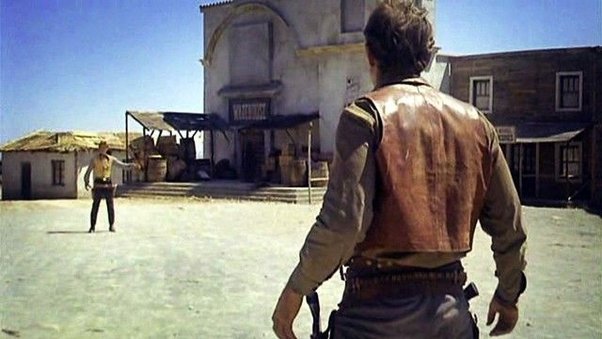
One of my favorite things while going through the entries of these showdowns is writers who try to hide multiple entries by sending them in under different e-mail addresses, but they use THE EXACT SAME FORMATTING as their other e-mail, making it obvious it’s the same person. I love that. Especially because there’s no limit to how many entries you can submit.
As always, it was fun reading through all the submissions. The main two reasons scripts didn’t make it was that the ideas weren’t high concept enough or the ideas were just messy. For example, I’d get stuff like, “A married couple trying to defeat a demon get stuck on a plane with a bomb on it.”
The most bizarre entry I got was a body-swap movie between Vince Vaughn and Chuck Schumer. The writer said their inspiration was they were listening to an interview with Chuck Schumer but thought they heard him introduced as Vince Vaughn, so they decided to write a body-swap movie about Chuck Schumer and Vince Vaughn. Hey! Who knows? Maybe it was great. A little too weird for High Concept Showdown though.
Every once in a while, I’d see a submission that would make me smile. It wasn’t quite right for the showdown. But it’d be creative. Here’s an example: “Simultaneously, across the world, everyone’s feet get stuck in place – trapping them to the circumstances of that moment. This is the story of the people in and around Toronto, Canada, as they navigate this unprecedented event.”
There were a lot of loglines that could’ve used consultations. I’m not just saying that because I offer them. But, seriously, a lot of you guys are majorly handicapping yourselves going out there with these loglines. They’re overwritten, or messy, or the first half doesn’t match the second half. It’s a huge problem that you have to figure out.
I’d say that 90% of the entries were out of the running just because their loglines were messy. As always, feel free to post your logline if you think your submission is better than what’s been posted. If you get overwhelming support from the community, I may just add your script to the mix on-the-fly. That’s how we do it here on Showdown weekend!
Of course, if you want it straight from the horse’s mouth, you can order a logline consult ($25), and I’ll give you a logline evaluation where I tell you what’s wrong with the concept, as well as the logline. And you get a logline rewrite. E-mail me carsonreeves1@gmail.com if interested.
And with that, it’s time!
Read as much of each script as you can, then VOTE FOR YOUR FAVORITE in the comment section. To do that, write a comment with the title of the script you like best. Every writer here would love it if you explained what you liked about their script. And you can also share what you didn’t like about the others.
But the key is, VOTE. Voting ends at 11:59pm Pacific Time Sunday. Whoever gets the most votes gets a review next Friday!!!
GOOD LUCK EVERYBODY!!!!!!
Title: The Castle
Genre: SciFi
Logline: In 1209, a reluctant German crown princess must defend her castle against a brutal group of bandits, consisting of special forces soldiers from the 21st century.
Why you should read: The Castle started as a first act contender and it did advance into the next round. In the last months I had time to finish and polish it, and so I will now throw it into the wild arena that is the amateur showdown.
Why Carson chose it: I remember reading the first 10 pages of this in the First Act Contest (which I will finish after the Dialogue Book!) and really liked them. And it’s just a big idea.
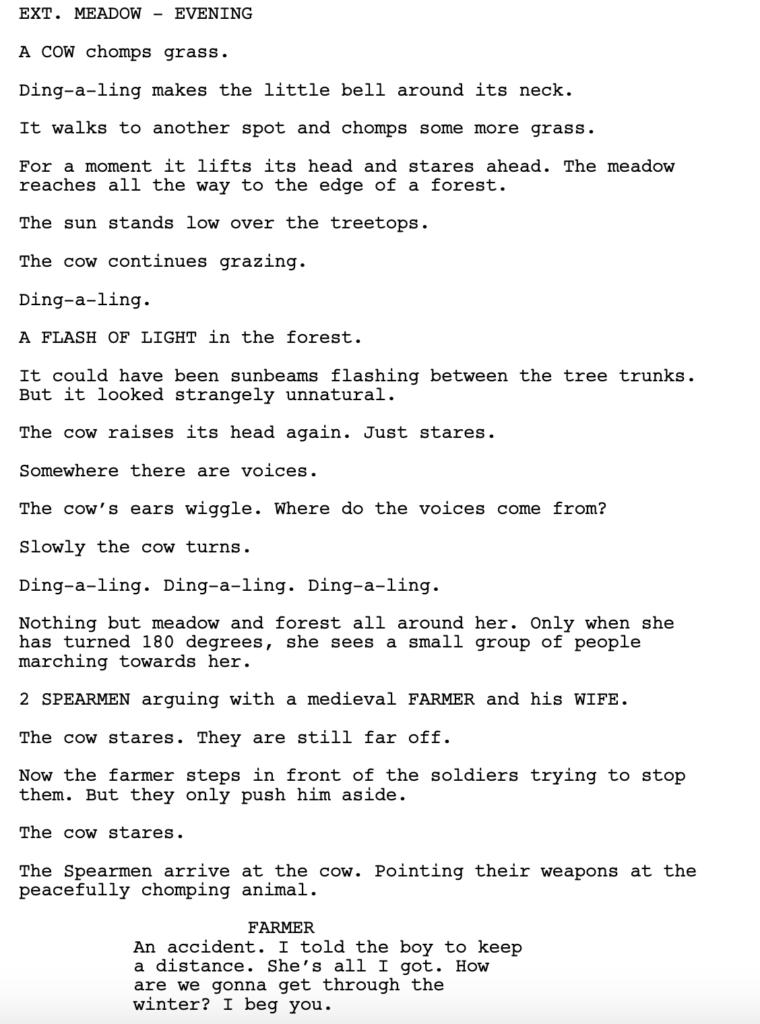
Title: Weekend Warriors
Genre: Action-Comedy
Logline: After a mysterious overnight event turns humanity into hordes of mindless violent drones, two hard-partying office rivals—still inebriated from the evening before—discover that the drugs and alcohol in their systems are the very things preventing them from becoming infected; the only way to stay alive long enough to save mankind will be to party like it’s the end of the world.
Why you should read: This drug-fueled blitzkrieg of a script was optioned in early 2020 by a major production company but died on the covid-coinciding vine. The rights are mine once more and I’m hoping a showdown appearance is just what is needed to give this wild ride a second life.
Why Carson chose it: This is a hilarious premise.
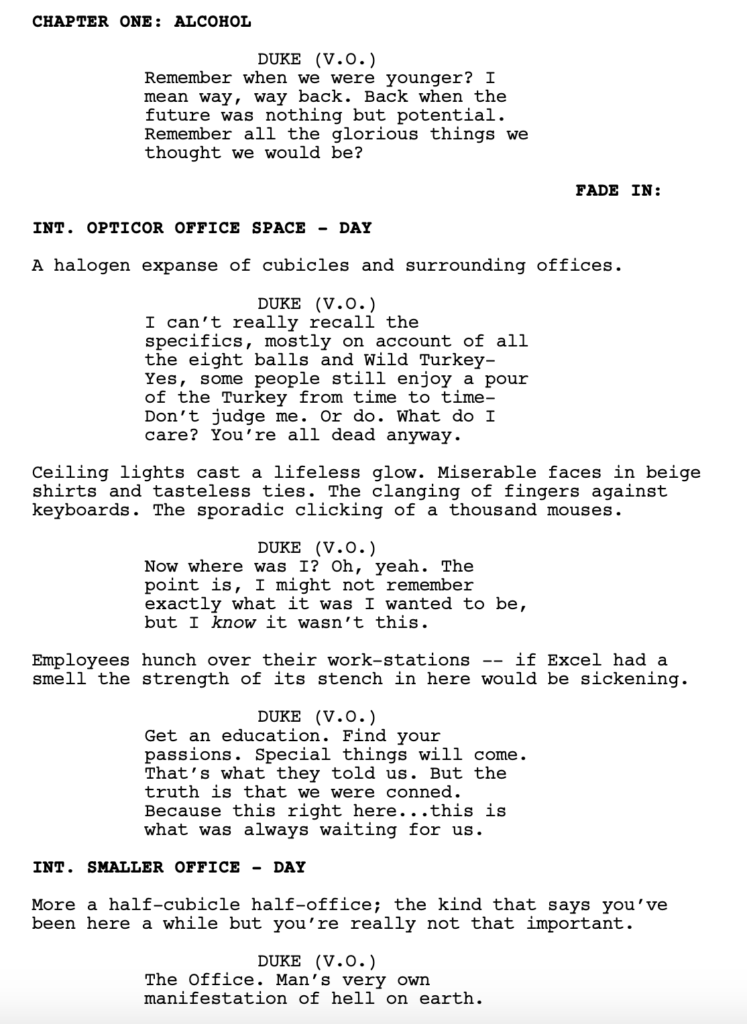
Title: Fleshy: The Selective Slaughter
Genre: Horror
Logline: A gathering of furries find themselves in a fight for survival at an infamously abandoned zoo when one of their own, revealed as anything but an ally, vows to hunt them down like the animals they dress as.
Why you should read: Scary movies have always been seen as a reliable moneymaker, and the box office results for 2022 have only further proven that audiences crave strange and subversive horror. FLESHY: THE SELECTIVE SLAUGHTER flips the classic slasher formula (in this script, the killer is the only one NOT wearing a mask) and, through the terror of a targeted hate crime, aims to shine a light on an underrepresented subculture while also telling a story about staying true to yourself which all audiences can relate to.
Why Carson chose it: I’m always looking for that one offbeat unique idea to feature in these showdowns and this one fit the bill. I’m hoping for the next “Fatties.”
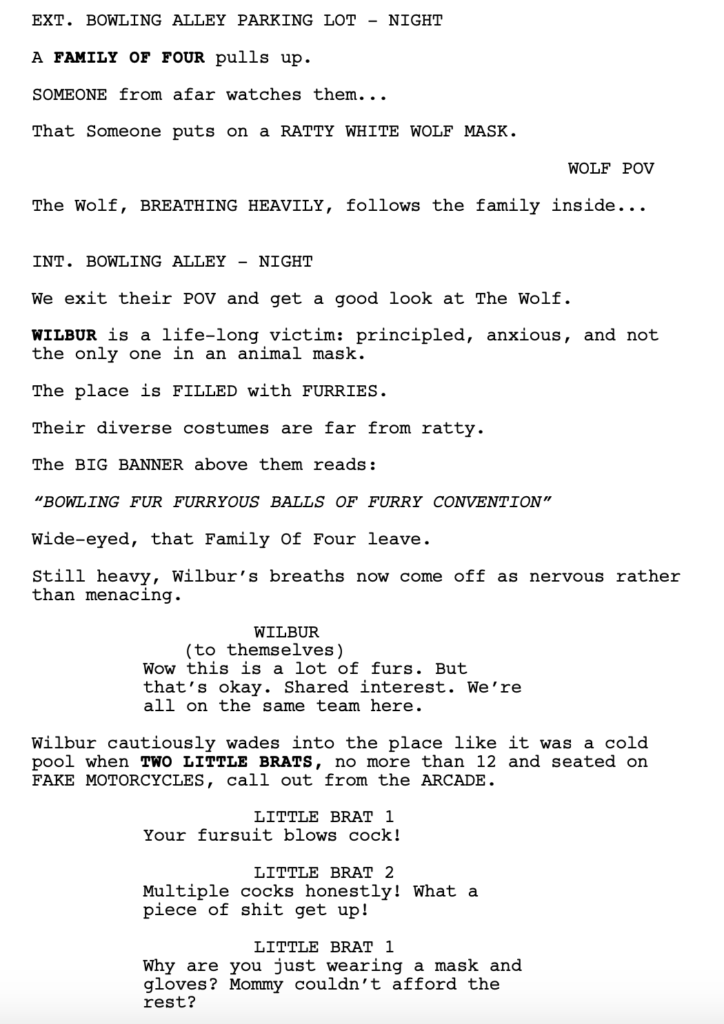
Title: The Burning Ones
Genre: Supernatural Thriller/Horror
Logline: Long thought to have disbanded in the 14th century, a secret order of Templar Knights operate in the modern age, hunting down the Seraphim, GOD’s fallen warrior angels who have chosen to join the forces of darkness.
Why you should read: This is the perfect mashup of action, adventure, and horror. 3 genres that bring every demographic to the theatre and will fill seats. Angels, Demons, Warriors, and Soldiers, as well as a child who may be humanity’s savior… or it’s doom. IT HAS IT ALL CARSON! That’s why you should click open and dive in!
Why Carson chose it: I wanted one entry that felt like a big fun action movie.

Title: GALE
Genre : Action – Thriller
Logline : When a violent, North Pacific storm traps two turbine techs on an offshore windmill, they must weather the storm overnight in order to survive.
Why you should read : Disaster films are tried-and-true blockbusters which always allure an international crowd. Now, let’s contain the threats of that disaster around a monstrous, yet claustrophobic structure that’s never been featured in a studio film. This location is susceptible to fires, explosions, destruction, and other electrifying outbursts that will make any action director salivate at the opportunity to get behind the camera. With a main cast of two, trapped in a battle between human nature versus mother nature, including hints of acrophobia, the most common fear, this movie will have any audience on the edge of their seats. GALE is an action-packed screenplay pitched as “Gravity on an offshore windmill”.
Why Carson chose it: This is right up my alley as an idea. It’s got everything I like in a spec script and a budget-friendly marketable movie in it.
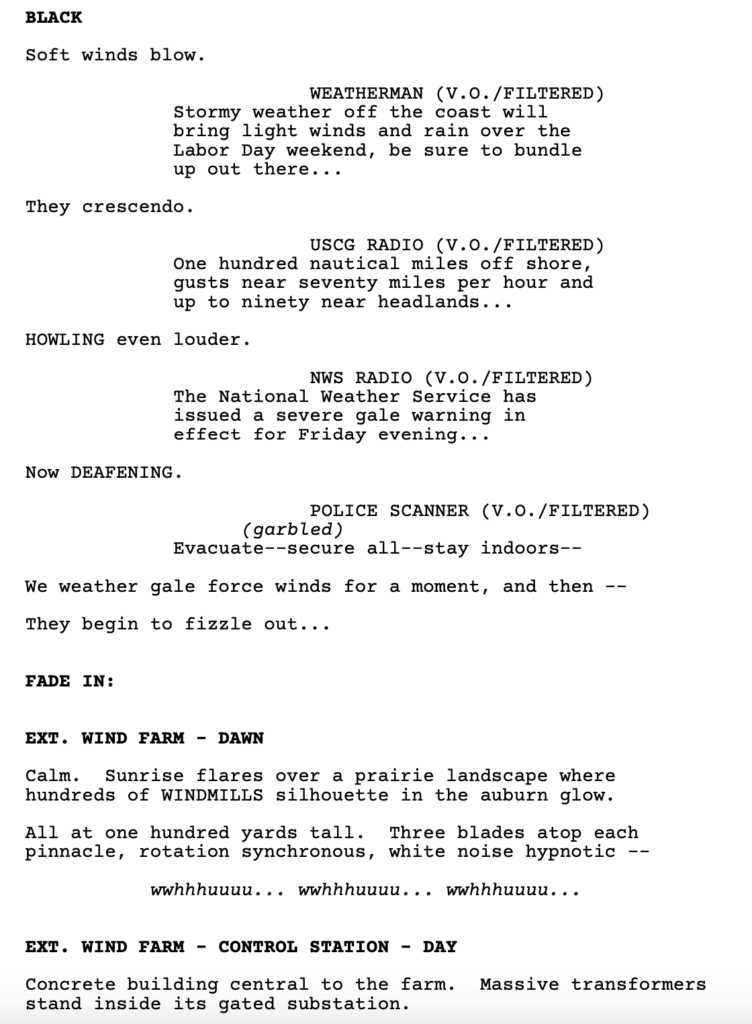
********
THURSDAY – DEC 1 – IS THE DEADLINE FOR THE HIGH CONCEPT SHOWDOWN!
SUBMISSION DETAILS HERE!
********

We are just about 24 hours away from the deadline to the High Concept Showdown. This has got me thinking about ‘concept’ and what kind of concepts get people to read scripts. Because, as I like to remind screenwriters, screenwriting is a numbers game. But it’s a numbers game you can win if you play the numbers right.
You simply do whatever you can to increase the number of people who read your script. The number one way to do that outside of having an agent hawking your script all over town, is to come up with a concept that intrigues people enough that they request your script. Too many writers skip this part of the process. Or they put their fingers in their ears and scream “lalalalaalalallalaal” so they don’t have to deal with it. They’d rather write whatever they want and deal with the potential downsides of a weak concept later.
Don’t do that!
A couple of days ago, I read a script from a young writer. Talented guy. Good with dialogue. He made interesting creative choices that gave his script an unpredictable narrative. But I had a talk with him afterwards and I told him, straight up, that promoting this script is going to be difficult (but not impossible) because it doesn’t have an obvious hook. It doesn’t have that juicy concept that gets a lot of people requesting the script. And, as we established, less requests means less of a chance that someone falls in love with it and wants to make it.
As I was explaining this to him, something occurred to me. The idea of a “hook” has changed over the years. By the way, the difference between a concept and a hook is that a concept is the whole enchilada – your whole idea. Whereas a hook is a component of the concept. It’s the part that gets potential readers/viewers excited.
So, if you look at the concept for Cocaine Bear, it would be, “A rural town is upended when a bear gets into a stash of ditched cocaine and becomes a raging predator, determined to take down anyone in its path.” That whole thing is the concept. But the actual hook is just a bear high on cocaine. As soon as the reader sees that, that’s the reason they want to read the script. (by the way, if you have this script, SEND IT TO ME! – carsonreeves1@gmail.com)
So, back in the day, a “hook” was synonymous with “high concept.” Aliens coming to earth to kill us all (Independence Day), a dinosaur theme park (Jurassic Park), a kid who can see dead people (Sixth Sense). There was an expectation that a movie had to feel BIG in order to get that “hook” label. That’s not the case anymore. Our entertainment becomes more fractionated every day. Big movies are relegated to a few key franchises.
This has expanded the definition of hook and it’s important to understand this new definition because, again, a hook is the reason someone wants to open your script. You don’t have to have the most amazing high concept in the world to get someone to request your screenplay. But you certainly need a hook. So let’s look at what that means in 2022.
The most obvious hook-y ideas are high concept ideas. These include the ones I mentioned above. It also includes movies like The Hunger Games, Inception, Don’t Look Up, Finch, and A Quiet Place.
The next class of ‘hook’ is ideas that have that one flashy element you can build a marketing campaign around (a poster and a trailer). The overall story doesn’t have to be some giant concept. You just need that poster-worthy element. Remember, all studios care about is people showing up. So the primary thing they’re concerned about is an idea that GETS PEOPLE TO SHOW UP. So any flashy item that achieves this is enough. Snakes on a Plane. Twister. Cocaine Bear. X. An evil smile (Smile).
The ‘cool idea’ hook is our third type. These are hooks where the overall movie idea itself is fun, interesting, or clever in some way. These movies usually take place in the real world. They don’t have anything fantasy-related or sci-fi related about them. They’ve just got a fun premise that captures your interest. This would be movies like Good Will Hunting, Knives Out, Parasite, Slumdog Millionaire, and The Hurt Locker.
The fourth class of hook is NAME BRAND RECOGNITION. This one has sort of always been around. But it’s increased in value recently. This hook includes anything in the world, past or present, that has some popular recognition. The idea here is that people will show up to watch things they know. This includes biopics (Elvis). It includes well known true stories (a movie about D-Day, for example). House of Gucci, the Dahmer series. I would even place “Once Upon a Time In Hollywood” in this category since it was promoted as a movie that indirectly covered Charles Manson. Lesser known real people or true stories do not fall into this hook category by the way. Bling Ring – no hook. Breaking (John Boyega movie based on a true story) – no hook.
The final and newest class of ‘hook’ is, in a way, a false hook. I’m not convinced that audiences care about this hook. But industry people are obsessed with it and since they’re the ones who can make your movie happen, impressing them is all that matters. And this is the social hook. It’s building your movie around a social issue. She Said. Fruitvale Station. Hidden Figures. Do The Right Thing. The Crying Game. All social hooks.
And yes, there is occasionally crossover with “Social Hooks” and “Name Brand Recognition Hooks.” Crossover is fine. Actually, you can crossover between all five of these with a single idea. But you need at least one hook element to hook a reader.
To that end, what does a movie idea without a hook look like? Unfortunately, we don’t usually see movies without hooks because a major reason the movie was able to get made was that it had a hook. If it doesn’t have one, it doesn’t get made. Sometimes, artsy writer-directors can get non-hook movies made because the movie is greenlit for them, not their idea. A few examples would include Nomadland, Cha-Cha Real Smooth, Columbus, Causeway, and Palmer. Some of you are probably saying, “I’ve never even heard of those movies.” And that may be the best example of why not having a hook is such a problem.
In order to gain a little more clarity over this, here are some movies and their hooks.
She Said – A social hook and a NAME RECOGNITION hook. The movie is about the #metoo movement as well as Harvey Weinstein. A good example of why social hooks are great for studio executives but not so great for audiences.
Nope – Nope definitely has a hook. I would put it in the first category. High concept hook. A group of people on a horse farm believe that an alien entity in the sky is stalking them.
The Whale – This is an interesting one because it does have a unique element to it that could arguably sell a film – a 600 pound man. There’s never been a movie before about a 600 pound man. So it does have some marketing value to it. But this is an example of how having a hook doesn’t necessarily mean it’s a good hook. On the “hook” scale, this is probably between a 6 and a 7 out of 10.
The Social Network – A good example of a NAME BRAND RECOGNITION hook. This was in the early days of Facebook so everyone was curious about Facebook at the time. It marketed itself.
Good Time – This movie doesn’t have a hook. A guy is trying to get his brother back and if he fails, his brother goes to jail. It takes place within 24 hours and speeds things along at an insane clip. But just as an idea? It doesn’t really have a hook. Trying to save someone is such a common setup for a movie that it’s not enough. Which is why, even though it’s a great movie, nobody was interested in checking it out.
Nightcrawler – This is another tough one because the world of late-night blood-chasing indie news vans was certainly an unknown world at the time. So it did have that unique element. But a clue as to whether something has a legit hook or not is how much the marketing campaign leans into the actor playing the role rather than the idea itself. Their whole marketing campaign for this movie was built around Jake Gylenhaal. Not what he was doing.
Ladybird – This one had a negative hook. Almost all coming-of-age scripts do. If you’re trying to break in as a screenwriter, stay away from these. They only get made if you’re the director and someone decides to finance the film. Although writer-directors can get them made.
The Big Short – Yes, this one would fall under BRAND NAME RECOGNITION. The 2008 financial collapse was a big enough event to create marketing recognition. With that said, it wasn’t the highest scoring hook. People eventually went to see it because of the actors. But graded as a hook alone, it was probably a 6 out of 10.
If all of this confuses you, take a step back and internalize what I’m about to say: Just write something you can honestly imagine people paying money to see. Where writers get into trouble is when they only write ideas that interest them, never considering the audience. Those are the ideas that tend to lack hooks.
Will be interesting to see which of your ideas hooked me tomorrow. HIGH CONCEPT SHOWDOWN is 24 HOURS AWAY!!!
Get A Screenplay Consultation from Carson! – Do you want me to look at your script? Tell you how it stacks up against the other 10,000 scripts I’ve read? How it stacks up against all the scripts being sent around town? Is it up to par with those scripts? Is it better than those scripts? Is it not as good? If so, what’s wrong? How can you fix it? This is my area of expertise so if you’ve been thinking about getting a consultation, now is the time to do so! I can give you $50 off if you mention this article. E-mail me at carsonreeves1@gmail.com to get started!
********
THURSDAY IS THE DEADLINE FOR THE HIGH CONCEPT SHOWDOWN!
SUBMISSION DETAILS HERE!
********
Genre: Period Piece/Biopic
Premise: An inside look at the unique relationship between John Wayne and John Ford, who collaborated on one of the greatest movies of all time, THE SEARCHERS.
About: This script made it on the 2019 Black List. Screenwriter MacMillan Hedges sold another script a couple of years ago about a time travel heist that I reviewed. He also worked as a writer’s assistant on the short-lived Robert Kirkman (Walking Dead) show, “Outcast.”
Writer: MacMillan Hedges
Details: 99 pages

I’ve tried to watch The Searchers a couple of times now but I haven’t been able to get past the first 30 minutes. And that’s because the first 30 minutes all take place in one room! Or, at least, that’s what I remember.
The problem with these older movies is they were operating along the same lines as the previous storytelling medium – plays. In plays, there’s only one stage. So you can’t have a bunch of locations. Movies took on that same approach and only, over time, moved away from it.
With that said, it’s still on my list of movies to finish. And if one of you can convince me why it’s worth finishing, I’ll watch it as soon as this week! But, in the meantime, I’m approaching today’s script only as a disconnected piece of storytelling through which I don’t understand all the variables. Take that for what it’s worth!
A young journalist named Peter Bogdanovich sets out to write a book about John Ford and The Searchers, his favorite movie. Ford is notoriously prickly about discussing his movies, especially that one, but he reluctantly gives Bogdanovich permission to write it.
This sends Peter off to get John Wayne’s take on the production. Wayne is doing something insane, which is self-financing a movie about the Alamo in which he’s both directing and starring. Once there, we begin cutting back and forth between Wayne and Ford’s recollection of their dysfunctional creative partnership.
What we mostly learn is that John Ford is a really really really really really bad person. He’s manipulative, mean, aggressive, a bully. Apparently, John Ford loved dressing down a crew member in front of everyone more than he did actually framing a shot. Mostly, Ford seems bored by his profession. I suppose it’s so mundane to him that he doesn’t see his work the magical way everyone else does.
As the characters recall the lead-up to The Searchers, we learn that Wayne was a nobody before Ford found him and Ford loved having that power. He loved that Wayne did badly whenever he didn’t do a movie with Ford. Ford would toy with him whenever Wayne’s career was in the toilet, dangling starring roles in front of him, creating doubt, only to, at the last second, offer him the role.
This dysfunctional whatever you’d call it relationship plays out through their entire careers. Even, at the end, Wayne struggles to reconcile who Ford was to him. He also must decide if protecting Ford’s biggest secret is worth what it costs him.
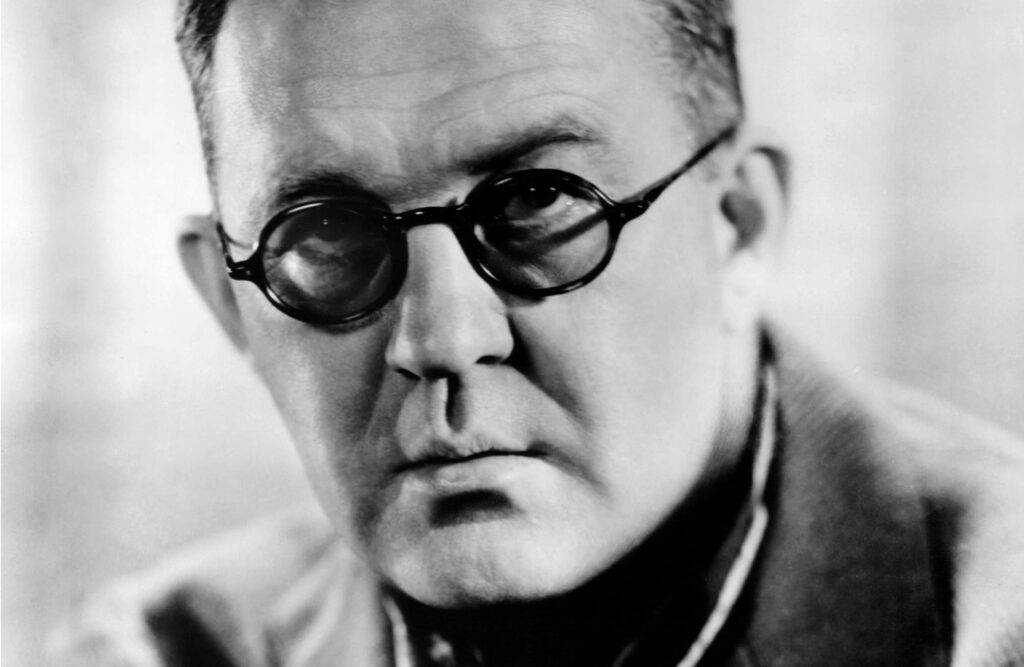 John Ford
John Ford
I think I learned something new today.
I like two-hander biopics!
It spices up a genre that is so vanilla, it borders on tasteless.
One of my big problems with biopics is they’re annoyingly predictable. But once you introduce the two-hander, that goes away. The very fact that you’re cutting back and forth between two people provides the script with a natural unpredictability.
The two-hander also infuses the biopic with conflict. At least if you do it right. Since, as a two-hander, you want to look for two characters who are at odds with each other rather than content. If you pick the right pair, it’s like a “versus” battle.
With that said, John Ford seems to be his own personal tornado of conflict. I didn’t know anything about the guy but he seems like a grade-A a$$hole to the millionth degree. Holy schnikees was he a jerk. I’m not one who supports cancel culture but I would not have minded seeing Ford go through the online mob wringer. This guy wouldn’t have made it past his first movie if he’d directed it today!
Granted, that’s what makes the script work. Ford is a total jerkface and Wayne is his forever punching bag. Watching their creative partnership play out is highly difficult at times. At one point, Ford cancels an entire day of shooting to force Wayne to learn how to walk like a man in front of the crew. This is the kind of terrifying dictator we’re dealing with.
This is also where the script runs into some trouble – and this is something I see periodically with two-handers. You have to be careful that the more dominant lead doesn’t overshadow the second lead. You’re always going to have a “bigger” character in a pairing. In this case, that’s Ford. He’s the big angry bully. But you still need to give your other character some weighty moments or else the script quickly becomes unbalanced.
Wayne spends the majority of this movie brow-beaten, like a little puppy who’s constantly being yelled at. Just because a character is quieter, like Wayne, does not mean that you can’t give them moments. Andy Dufrense, in The Shawshank Redemption, is a quiet character. But he still has big moments. Like when he locks himself inside the music room and plays Opera for the entire prison, despite knowing that he’ll spend a month in isolation for it.
The script also doesn’t quite know what it wants to be. Its title promises an exploration of The Searchers. But that’s not what it is at all. At one point we zag into the 1940s Hollywood Blacklist saga and I was sitting there wondering, “Where is this going?” I suppose you could argue that the title is a metaphor for these two searching for meaning or something. No offense, but eff off. Moviegoers hate when they’re promised one thing and are given something else. That’s one rule you do not want to violate.
Luckily, there’s enough interesting stuff here, especially if you’re ignorant about these two like me, to make this worth reading. The relationship itself between the two lives up to the hype, especially the stuff about Ford hating Wayne for never joining the war.
And I also think the script asks a question that all artists must ask themselves again and again throughout their career, which is, how uncomfortable are you willing to be for success? Because, usually, you have to sacrifice a high degree of comfort to be successful.
That’s the footnote of Wane’s relationship with Ford. Ford was the only one who got great performances out of Wayne. That’s why Wayne kept going back to him even though it made him miserable. Because he knew that every movie he’d make with Ford would be good.
Kudos to Wayne for that because that’s not easy to do. Who wants to be miserable for a whole year? We only get like 80 of them.
It’s an imperfect script but the two-hander biopic angle and all the interesting history you learn about this relationship, as well as a nifty little surprise ending, makes the script worth the effort.
Script link: The Searchers
[ ] What the hell did I just read?
[ ] wasn’t for me
[x] worth the read
[ ] impressive
[ ] genius
What I learned: The one major ingredient that could’ve really helped this script was stakes. There were none. Why does this book need to be written? What is gained if it is? What is lost if it isn’t? That’s the “stakes” question you want to ask of every character objective in your screenplays. What is gained if it’s attained and what is lost if it’s not? If the answers to those two questions are, “Not much” and “Not much,” you need to come up with some stakes, brother.
********
THURSDAY IS THE DEADLINE FOR THE HIGH CONCEPT SHOWDOWN!
SUBMISSION DETAILS HERE!
********

With Thanksgiving and its 9000 calories worth of delicious stuffing officially behind us, the all-out sprint to Christmas has begun! I spent my Thanksgiving up at my brother’s place in Portland, which is the polar opposite of Los Angeles. Here, it is dry and sunny. There it is wet and rainy. Here, everything is brown and sandy. There, everything is green and lush. Here, we have overrated tourist stops. There, they have overrated donuts.

As part of our holiday activities, we watched a lot of Christmas movies. Now, I did draw the line at any Lindsey Lohan-led Christmas product. Fortunately, there were no official requests for the Loster, so I was able to make it though the weekend Lohan-free.
But pretty much everything else was on the table. As such, I watched Reynolds and Ferrel in Apple’s, “Spirited.” I watched the return of Ralphie in A Christmas Story Christmas. And I watched James Gunn’s halfquel, the Guardians of the Galaxy Holiday Special. I’m going to review all three of those here, from worst to best. Before I do that, take a quick guess on what you think my order is.
The loser of our bunch was, unfortunately, A Christmas Story Christmas
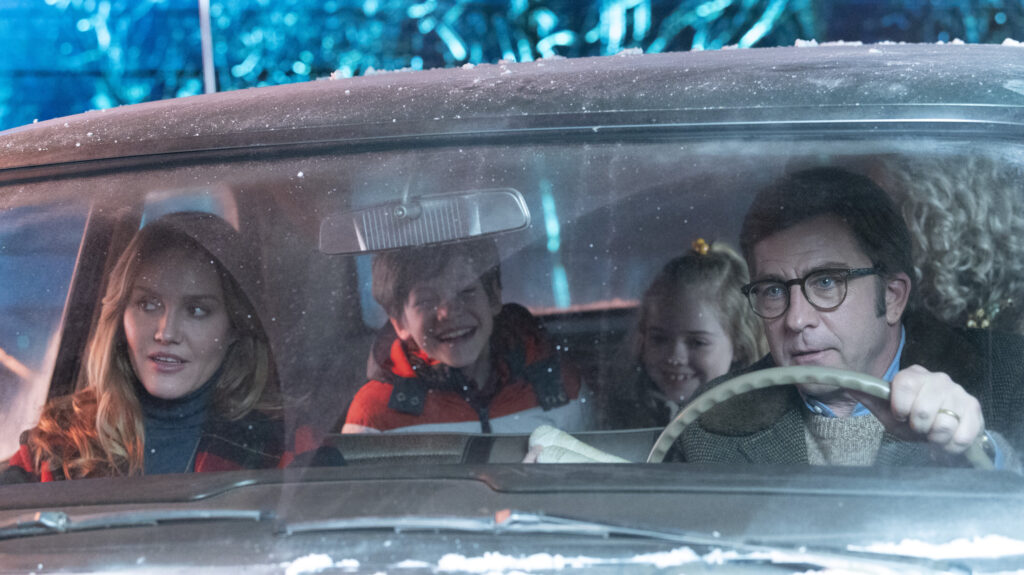
As I’ve said before, every hit movie that has ever been made is the equivalent of lightning in a bottle. It’s this special thing that happens where everything magically comes together in just the right way at just the right time. No matter how hard Hollywood tries to replicate this lightning, it never works. And that’s because you can’t recreate magic!
Let me give you an example of how hard it is to replicate a great movie. I remember M. Night talking about directing Bryce Dallas Howard in Lady in the Water. Night had directed Howard a few years earlier in the hit movie, The Village. And he talked about how, in between those two movies, Howard had grown up. Whereas, before, she was utterly committed to anything the director asked, this time, she was much more closed off and acting on her terms only. As such, she didn’t give nearly as good of a performance.
That’s the kind of thing that can ruin a movie. And it’s just ONE SINGLE VARIABLE within thousands that you have no control over. The operating modus in Hollywood is to get movies made. That alone is an impossible thing to do. When a few of those movies actually turn out to be good? That’s the miracle. Because, again, you have so little control over everything that, odds are, the movie’s not going to turn out the way you hoped.
A Christmas Story is one of the clearest examples of this. It was a bit of a weird movie that came out of nowhere. But something about the film undeniably worked. It captured the holiday through the eyes of children better than, probably, any movie in history.
Star Peter Billingsly seems to be aware of my Lightning in a Bottle theory as he’s resisted a sequel for years. It was only his good friend, Vince Vaughn, who finally convinced him to do it. I’m sad to say, though, that Billingsly was right and Vaughn was wrong.
The movie made a pretty bold creative choice early on that put it behind the eight ball. The first movie was about seeing Christmas through the eyes of a child. The new film was about seeing Christmas through the eyes of an adult. And, because of this, the movie couldn’t match the charm the first film had. You can’t make something as charming when it’s a hardened 40 year old analyzing it as opposed to an innocent 10 year old.
My dad, who loves the original Christmas Story, gave up on the new film about halfway through. There’s this scene where Ralphie’s friend challenges his other friend to a sled run down a manufactured toboggan structure. So everybody goes out to watch the friend sled down this enormous wooden contraption that didn’t even have a bottom. The bottom was nothing. So, once you got to the bottom, you would shoot off into the air and then fall another 50 feet to the ground.
And my dad said, “This isn’t real. The thing about the first one was everything was real. Nobody would actually sled down this thing because they’d probably die.” And he was right. It was a zany unrealistic situation that wouldn’t have made it into the first film. It violated that authenticity that made the original work. So, this one was a no-go for me.
The number 2 movie on the list is Spirited!
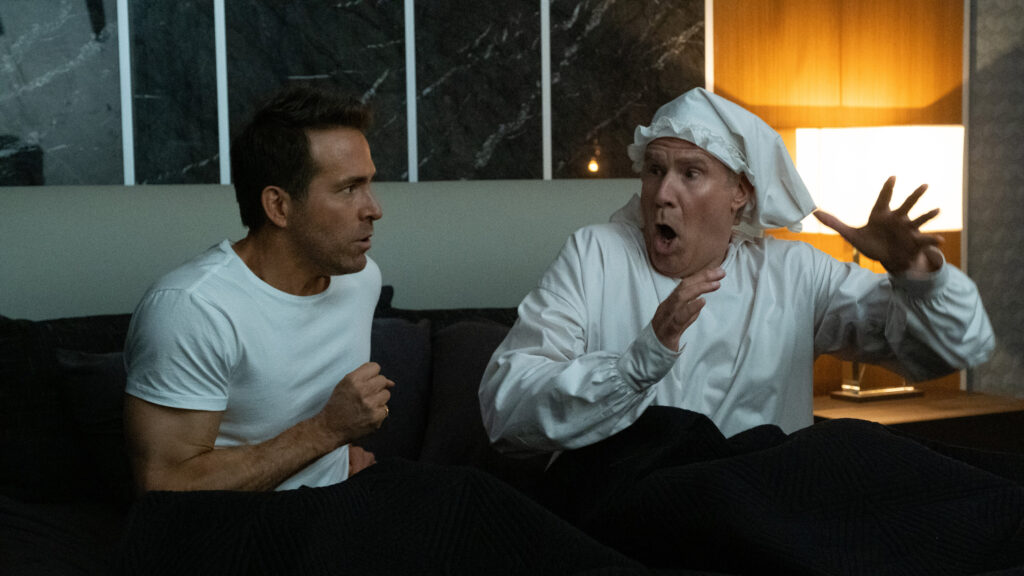
I was really looking forward to this movie. Ferrel and Reynolds working together felt like a no-brainer. And the movie definitely has its moments, more so than A Christmas Story Christmas. But the discussion of whether the film works is much more involved and nuanced.
Spirited does something I tell everyone on this site to do. Which is to find a fresh way into your story. Spirited does that in spades. They take the classic Charles Dickens story and ask the question, what if we told the story through the point-of-view of one of the ghosts as opposed to Scrooge?
As a screenwriter, I love this idea. IN THEORY. A change of POV is a smart way to find a fresh angle. But what you have to understand is that, with great stories, there’s a reason why they work so well. There’s a reason why telling this story from Scrooge’s point of view is so important to it working. When you upset that carefully constructed balance, you are sailing into uncharted waters. And that’s definitely how Spirited played out. It was like, “Okay, we’re going in this direction. I’m not quite sure how to handle it but I guess we’ll figure it out along the way!”
(Spoiler) And they make some fun choices. As it turns out, Will Ferrel’s ghost character is Scrooge! But he needs to be saved a second time. Again, as a screenwriter, I love this choice. You flip everything on its head. The student is helping the teacher rather than the teacher helping the student. It’s as fresh as fresh can be.
But when you’re trying to make a story work with a totally different set of variables than how it usually works, it’s a bit like driving a car backwards on the interstate. The car is still moving. But the chances of crashing and burning go up exponentially. Personally, I felt this movie was trying so hard to be different that it never found its groove.
So, while I probably wouldn’t recommend it, I don’t think you’re wasting your time if you pop it in between now and Christmas. It’s hard not to enjoy Ferrel and Reynolds in anything. And the movie has a genuine earnestness, whereas A Christmas Story Christmas never got there. So, if you’re choosing between the two, definitely go with Spirited. It’s got the best production value of a Christmas movie this year.
And our number one Christmas movie is…… little drummer boy roll please… Guardians of the Galaxy Holiday Special!
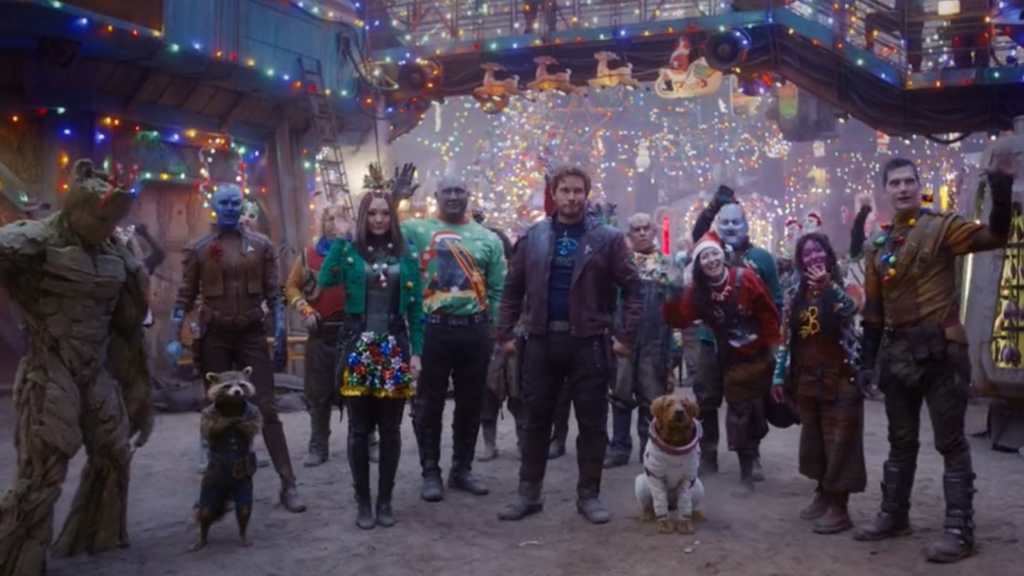
This is one of those times where I wish I didn’t follow the movie industry as closely as I do. Because when you do, you know certain things about projects that you wish you didn’t know. For example, you know that James Gunn wrote this script in less than three hours. You know that they filmed this movie between takes during Guardians of the Galaxy 3. Those things were percolating through my head the whole time I watched the mini-feature.
Cause I’m going to be honest. This *felt* like it was written in a few hours. And it truly felt like they had three locations and everyone was sort of tired and reluctantly standing around in each take.
Now, does that mean I didn’t like it? No!
I did like it!
And that’s mainly because the premise was so fun. Kevin Bacon was Peter Quill’s favorite actor when he grew up as a kid in the 80s on earth. So teammates Drax and Mantis travel to earth to kidnap Kevin Bacon so they can give him to Peter as a Christmas present. That idea beats out the ideas of A Christmas Story and Spirited easily.
Also, James Gunn is just funnier than the writers working on those two films. We eventually find out that Peter told his Guardians teammates about Kevin Bacon AS IF HE WAS A REAL PERSON rather than being a movie star. So Drax and Mantis think that Kevin Bacon really did save a town by dancing. They think he really did help kill a bunch of giant killer worms under the desert. When they find out he’s just an actor, they’re furious.
Also, what I didn’t know was, which this special made clear, that Peter Quill saving the universe at the end of the first movie by dancing was done because Kevin Bacon was his hero and Kevin Bacon saved the day by dancing in Footloose. So it was fun to learn Peter’s inspiration for that climactic moment.
I also liked that they created a brand new soundtrack for the film – creating new Christmas songs. At least I’d never heard these songs before so feel free to correct me if I’m wrong.
I wish Peter Quill had a little more to do than just stand around and look either bummed or excited. I wish there were more than three locations. But if you’re looking for a movie to get you in the Christmas mood and do so in an original fashion, it’s the Guardians Holiday Special all the way, baby. This is what I would pick over literally, every holiday movie on streaming right now.
Which one was your favorite?

